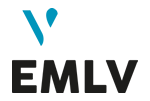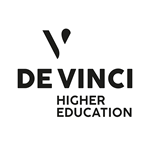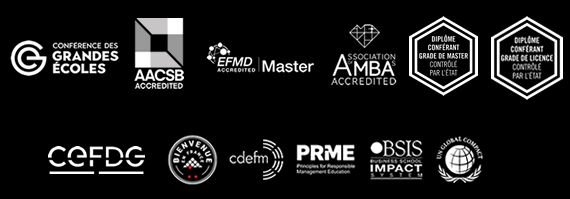Since October 2019, EMLV is a signatory to the United Nations’ Principles for Responsible Management Education (PRME). Therefore, Pole Leonard de Vinci commits himself in fulfilling the 6 principles of PRME: purpose, values, method, research, partnership and dialogue.
As a member of the UN PRME programme, EMLV joins a global network of 800 business schools from over 40 countries, signatories in a common goal: to “raise the profile of sustainability in schools around the world and to equip today’s business students with the ability to deliver change tomorrow“.
Launched in 2007, in Geneva, during the United Nations Global Compact Leaders’ Summit, the PRME process is seen as “probably the most solid initiative to inspire and champion responsible business education globally“.

The logo of PRME
PRME is the UN Global Compact‘s initiative to transform management education, research and thought leadership globally by providing the Principles for Responsible Management Education framework, developing learning communities and promoting awareness about the United Nations’ Sustainable Development Goals.
PRME’s vision is to “realise the Sustainable Development Goals through responsible management education“.
Six Principles for Responsible Management Education
The signatories of the PRME undertake to use the Six Principles to implement sustainability and responsible management within their institution’s operations, curriculum, and research :
- Principle 1 | Purpose : Business schools commit to developing the capabilities of students to be future generators of sustainable value for business and society at large and to work for an inclusive and sustainable global economy.
- Principle 2 | Values: Participating members incorporate into their academic activities, curricula, and organisational practices the values of global social responsibility as portrayed in international initiatives such as the United Nations Global Compact.
- Principle 3 | Method: Signatories create educational frameworks, materials, processes and environments that enable effective learning experiences for responsible leadership.
- Principle 4 | Research: Business schools engage in conceptual and empirical research that advances our understanding about the role, dynamics, and impact of corporations in the creation of sustainable social, environmental and economic value.
- Principle 5 | Partnership: The members of the signatory network interact with managers of business corporations to extend their knowledge of their challenges in meeting social and environmental responsibilities and to explore jointly effective approaches to meeting these challenges.
- Principle 6 | Dialogue : Business schools are also commited to facilitate and support dialog and debate among educators, students, business, government, consumers, media, civil society organisations and other interested groups and stakeholders on critical issues related to global social responsibility and sustainability.
PRME at the Pole Leonard de Vinci
As a signatory of the PRME, Pole Leonard de Vinci is well-positioned to continue to embrace the ten principles of the UN Global Compact. UNGC is the world’s largest sustainability initiative which encourages companies to align their operations and strategies around universally accepted principles in the areas of human rights, labor, environment and anticorruption. Pole Leonard de Vinci has joined the UNGC collective in Mars 2017.
Over the last three years, Pole Leonard de Vinci has seen several student positive actions for the environment.
2019/2020
- September: Week of Transversal Competencies: The Climate Fresco (1 200 students from all three schools of the Association working in mixed groups of engineers, managers and design)
- November: Week of Transversal Competencies that mixed the learning of Soft Skills, a multidisciplinary working approach and thinking on biodiversity and sustainable development for over 1.200 students
- November: Student action to reduce plastics through the use of biodegradable/recyclable drinking bottles involving more than 500 students and the distribution of over 1 000 bottles
2018/2019
- March: Week of Transversal Competencies that mixed the learning of Soft Skills, a multidisciplinary working approach and thinking on frugal innovation and sustainable development for over 1000 students
- April: The Devinci Durable Association organized a Week of Transversal Competencies, called Green Week. Recognized by the Conférence des Grandes Écoles, the activity addressed five topics in an original way: climate (with the help of Avenir Climatique), consumption, alimentation, biodiversity (with the support of NGO Surfrider Foundation) and innovation
2017/2018
- March: The objective of this transversal week was to generate innovative ideas about responsible entrepreneurship. 4th-year students presented their projects in a showroom, combining societal themes and innovative entrepreneurial practices
- April: Nearly 900 students worked in a multidisciplinary team on a climate theme: mitigate, adapt to, or raise public awareness of the effects of climate change. The Department of Soft Skills/Transverse Pedagogy organized the event with the support of the C3D (College of Sustainable Development Directors), the Shift Project and e-rse.net.
- July: Transversal Week treated the theme of artificial intelligence and the general public, which included helping the handicap gain access to AI
2016/2017
- November: The city of Colombes partnered with the Association to propose a transversal week on innovation and sustainable development themes to introduce students to sustainable development and RSE-RSO involving over 560 students.
- July: During an entire week sponsored by Altran, 750 students conceived and designed an innovative, efficient and competitive factory. Many issues were considered by the jury: economic, technological, organizational, environmental, and societal.
In addition to the above, EMLV, the business school Leonard de Vinci, incorporates specific modules in all programs that address corporate responsibility, sustainability and ethics.


















